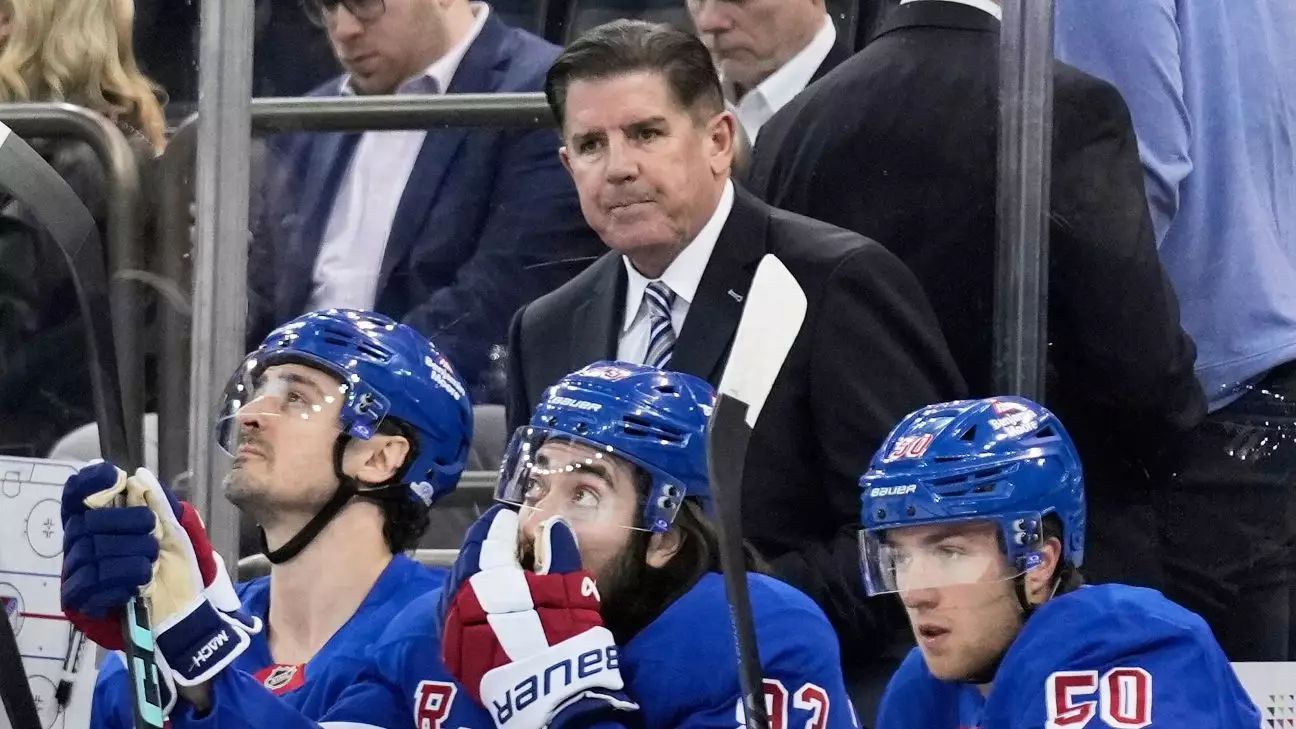The New York Rangers’ recent decision to part ways with head coach Peter Laviolette encapsulates a trend of chaos and instability that has plagued the franchise for the past few seasons. Laviolette, who arrived as a seasoned leader with a Stanley Cup victory under his belt, was supposed to usher in a new era for the Rangers after their promising run to the Eastern Conference finals last year. However, the optimism quickly dissipated as the team’s hopes for a Stanley Cup became choked by inconsistency and disappointing performance.
What’s more striking than Laviolette’s exit is the underlying narrative of repeated failures that has now resulted in a revolving door of head coaching positions since 2021. With Laviolette’s release, the organization joins a dangerous cycle; a cycle that sees a lack of unity and vision at the top, resulting in the systematic dismantling of what could have been a competitive team. When a franchise dismisses its fourth head coach in less than three years, it raises red flags about management, strategy, and the overall direction of the team.
Trade Turmoil: A Half-hearted Attempt at Change
The season commenced with high hopes, buoyed by a strong start. But as fate would have it, a string of defeats soon shattered any illusions of a coherent strategy. Instead of solidifying a competitive roster, general manager Chris Drury opted for a haphazard approach, trading key figures like Jacob Trouba and Kaapo Kakko in what felt like panic moves rather than calculated risks. The moves appeared to lack a broader vision and left fans wondering whether the Rangers are genuinely committed to winning or are merely playing a game with arbitrary pieces on the board.
The dysfunctional culture isn’t limited to coaching changes or trades; it extends to the very core of how the organization operates. With players coming and going, they are left without a firm foundation or identity. It’s one thing to refresh the roster but quite another to do so at the expense of team chemistry and morale. By the end of this season, the concept of continuity had been eviscerated, overshadowing the potential for growth among the players who strive to form a cohesive unit on the ice.
Looking Ahead: A Call for New Ideas
As the Rangers embark on yet another coaching search, they must confront the reality of their precarious situation. Names like John Tortorella and Joel Quenneville have emerged as potential candidates to fill the vacant position. While both have proven track records, the question remains: will the organization invest in another long-term vision, or will they merely be searching for the latest quick fix?
Importantly, this moment serves as an opportunity for the Rangers to reassess their ethos. Hiring a coach who can foster a supportive and inclusive atmosphere for players is pivotal. Strong leadership is rooted not only in tactical acumen but also in nurturing young talent, maximizing each player’s potential and galvanizing team spirit. The road ahead must prioritize an environment where players feel engaged and passionate about their contributions.
Furthermore, the organization’s leadership ought to establish a comprehensive plan that aligns coaching, player development, and strategic drafting in a cohesive framework. It’s about more than just winning games; it’s about cultivating an identity that fans can rally behind, fostering a sense of pride that transcends wins and losses.
The Broader Implications: What Does It Say About the NHL?
The ongoing saga of coaching changes within the Rangers is a microcosm of the larger issues facing teams across the NHL. Instability breeds uncertainty, making it challenging for players to thrive in their respective roles. It raises crucial questions about the strategies that teams choose to adopt within a league that is becoming increasingly competitive.
As the dust settles from this latest coaching shake-up, the Rangers have an opportunity to lead by example, breaking the cycle of blame and scapegoating that has characterized so many franchises over the years. If they can step back, reassess their priorities, and establish a coherent vision for their future, they could emerge not only as a formidable contender but also as a beacon for a more strategic approach to building successful hockey teams in an era defined by analysis and analytics.
In an ever-evolving landscape, clarity and coherence will be the keys to turning the Rangers’ fortunes around — an essential reality in a league where mediocrity simply won’t cut it anymore.


Leave a Reply